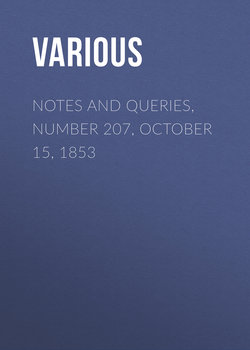Читать книгу Notes and Queries, Number 207, October 15, 1853 - Various - Страница 7
Notes
DEATH ON THE FINGERS
Оглавление"Isaac saith, I am old, and I know not the day of my death (Gen. xxvii. 2.); no more doth any, though never so young. As soon (saith the proverb) goes the lamb's skin to the market as that of the old sheep; and the Hebrew saying is, There be as many young skulls in Golgotha as old; young men may die (for none have or can make any agreement with the grave, or any covenant with death, Isa. xxviii. 15. 18.), but old men must die. 'Tis the grant statute of heaven (Heb. ix. 27.). Senex quasi seminex, an old man is half dead; yea, now, at fifty years old, we are accounted three parts dead; this lesson we may learn from our fingers' ends, the dimensions whereof demonstrate this to us, beginning at the end of the little finger, representing our childhood, rising up to a little higher at the end of the ring-finger, which betokens our youth; from it to the top of the middle finger, which is the highest point of our elevated hand, and so most aptly represents our middle age, when we come to our ακμὴ, or height of stature and strength; then begins our declining age, from thence to the end of our forefinger which amounts to a little fall, but from thence to the end of the thumb there is a great fall, to show, when man goes down (in his old age) he falls fast and far, and breaks (as we say) with a witness. Now, if our very fingers' end do read us such a divine lecture of mortality, oh, that we could take it out, and have it perfect (as we say) on our fingers' end, &c.
"To old men death is præ januis, stands before their door, &c. Old men have (pedem in cymbâ Charonis) one foot in the grave already; and the Greek word γήρων (an old man) is derived from παρὰ το εἰς γὴν ορᾶν, which signifies a looking towards the ground; decrepit age goes stooping and grovelling, as groaning to the grave. It doth not only expect death, but oft solicits it."—Christ. Ness's Compleat History and Mystery of the Old and New Test., fol. Lond. 1690, chap. xii. p. 227.
From The Barren Tree, a sermon on Luke xiii. 7., preached at Paul's Cross, Oct. 26, 1623, by Thos. Adams:
"Our bells ring, our chimneis smoake, our fields rejoice, our children dance, ourselues sing and play, Jovis omnia plena. But when righteousnesse hath sowne and comes to reape, here is no haruest; οὐκ εὐρίσκω, I finde none. And as there was neuer lesse wisdome in Greece then in time of the Seven Wise Men, so neuer lesse pietie among vs, then now, when vpon good cause most is expected. When the sunne is brightest the stars be darkest: so the cleerer our light, the more gloomy our life with the deeds of darkness. The Cimerians, that live in a perpetuall mist, though they deny a sunne, are not condemned of impietie; but Anaxogoras, that saw the sunne and yet denied it, is not condemned of ignorance, but of impietie. Former times were like Leah, bleare-eyed, but fruitful; the present, like Rachel, faire, but barren. We give such acclamation to the Gospell, that we quite forget to observe the law. As vpon some solenne festivall, the bells are rung in all steeples, but then the clocks are tyed vp: there is a great vntun'd confusion and clangor, but no man knowes how the time passeth. So in this vniuersall allowance of libertie by the Gospell (which indeed rejoyceth our hearts, had we the grace of sober vsage), the clocks that tel vs how the time passes, Truth and Conscience, that show the bounded vse and decent forme of things, are tyed vp, and cannot be heard. Still Fructum non invenio, I finde no fruits. I am sorry to passe the fig-tree in this plight: but as I finde it, so I must leave it, till the Lord mend it."—Pp. 39, 40., 4to. Lond. 1623.
Balliolensis.
